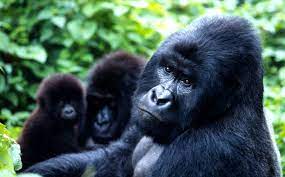On October 4th, we celebrate World Animal Day. It is charged with the mission to raise awareness to the status of animals to improve their welfare standards worldwide. Already in 1931, the World Animal Day was introduced at a convention of ecologists in Florence, Italy, as a way of highlighting the plight of endangered species.
Endangered species
Did you know that there are now 41,415 species on the IUCN Red List, and 16,306 of them are endangered species threatened with extinction? This number includes both: endangered animals and endangered plants. Among the 10 most endangered animals in 2021 you will find the Javan Rhinoceros, Vaquita, Mountain Gorilla, Tiger, Asian Elephant, Orangutans, Leatherback turtles, Snow leopards, Irrawaddy Dolphins, Bluefin Tuna.
Hunting and trophy tourism on endangered species
In many countries, trophy hunting is a very lucrative form of wildlife use (few tourists, high revenues) and wildlife management at the same time. Compared to photo (mass) tourism, the cost of infrastructure such as hotels and roads is considered to be less. Projects that give the local population responsibility for the sustainable use of the sustainable use of “their” wildlife often result in the (re-)valorization of wildlife that was previously only competitors for food or a direct threat to their own lives. After the USA and Spain, German hunters are front runners when it comes to hunting endangered and protected species. Every year, trophies of several hundred protected animals are imported into Germany – quite legally and often even with the permission of the competent authorities. In 2019 alone, 750 animals of endangered or protected species were imported. Between 2017 and 2020, hunting trophies of 628 zebras, over 425 monkeys, 104 brown bears, 89 leopards, 99 hippos, 92 African elephants, 68 lions, 58 wolves, 36 wild sheep, 31 giraffes, 25 cheetahs, ten rhinos, seven polar bears, as well as numerous other protected species were imported into Germany or corresponding import permits were issued. In Germany, dozens of tour operators are even specialized in hunting tours legally offer the shooting of endangered species. The greatest perversion: the rarer the species and the larger the horns, manes, skins, and tusks of the killed animals, the higher the price for the kill and the higher the status gain for the hunter. Hunting associations such as the Safari Club International (SCI) and the “International Council for Game and Wildlife Conservation” (CIC) even keep record books and point catalogues and award medals to the killers of the “most capital” trophies.
Against nature
Trophy hunting is more than questionable not only for ethical reasons, but also from an ecological point of view: trophy hunters often target – as mentioned above – rare species – and here, of all things, the strongest, most experienced, and most important animals for the preservation of the species. This unnatural selection can have fatal consequences for the survival of a species. Across the Red List of Threatened Species, some developing countries, but also some rich countries, such as Canada, allow well-heeled foreign hunters to shoot animals. Even species that are strictly protected by the Washington Convention on International Trade in Endangered Species of Wild Fauna and Flora are not exempt from hunting: because the import of hunting trophies is considered a private pleasure and “non-commercial”, it is usually exempt from import bans and legal with permission. European law such as the EU Flora-Fauna-Habitat (FFH) Directive, which prohibits the killing of native species such as brown bears and wolves, is circumvented by declaring individuals to be allegedly “problem animals” and allowing hunters to shoot them and export their trophies for a corresponding fee.
Action against trophy hunting
In 2015, following international outrage, France became the first EU country to stop the import of lion trophies, and in 2016 the Netherlands issued an import ban on trophies of all protected species. In 2020, the UK government announced that it would ban imports. The USA and Australia also have restrictions on certain species. Several companies, including eBay, airlines and air freight companies, also ban the sale or transport of trophies. But much remains to be done to stop the bloody business of hunting trophies. Yet, despite years of protests by Pro Wildlife and other animal and conservation organizations, the German government, for instance, continues to allow the import of hundreds of animals of endangered species every year.
European Liberals for Reform – Working group: Agriculture, Animals & Nature
Are you interested in this topic? ELfR set up a working group for agriculture, animals & nature. You will find more information here.
Author Profile
-
Co-Founder of European Liberals for Reform
Chairperson of ELfR Working Group Health
ALDE Individual Members Steering Committee Member (2022-2023)
Social Media & Digital Marketing Expert, Blogger
Favorite Topics: Health, Society, LGBTQI
Latest entries
 Elections13/04/2022Presidential elections in France 2022
Elections13/04/2022Presidential elections in France 2022 Human Rights22/03/2022ELfR to support Manifesto for inclusive gender-based violence law
Human Rights22/03/2022ELfR to support Manifesto for inclusive gender-based violence law EU07/03/2022Five possible scenarios for the outcome of the Ukraine war
EU07/03/2022Five possible scenarios for the outcome of the Ukraine war Ukraine06/03/2022ELfR starts petition to nominate Volodymyr Zelenski for Sakharov Prize
Ukraine06/03/2022ELfR starts petition to nominate Volodymyr Zelenski for Sakharov Prize
Post Disclaimer
The opinions expressed by the author of this post do not necessarily represent the opinions and policies of ELfR.

